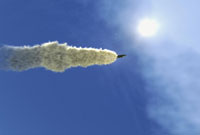Georgia bent on stirring trouble with Russia to secure NATO membership
It is obvious that Georgia has to resort to rather extraordinary tactics now bordering on blatant lies so that the issue of Russia’s “aggression” against Georgia may hold the spotlight in the media. Last week the Georgian Foreign Ministry accused Russia of yet another violation of Georgian airspace, an incident that allegedly took place on August 21. However, a number of details released by Georgian authorities with regard to the purported violation make one call into question Georgia’s allegations. The timing of the latest allegations, which were predictably denied by Russia, seemed to be quite perfect for a special meeting of NATO Council, which considered last Wednesday the issue of Georgia’s accelerated integration into the system of sharing radar data between NATO and Georgia.

According to the Georgian Foreign Ministry, a Russian aircraft illegally crossed Georgia’s borders on August 21 at 6.46 p.m. local time. The violation allegedly occurred north of Omarishara village in Upper Kodori gorge. In connection with the incident, the Georgian Foreign Ministry sent a note of protest to the Russian Foreign Ministry. The note demanded that the Russian government provide a “clear and immediate explanation pertaining to the fact.” It is noteworthy that the Georgian Foreign Ministry released some flight parameters while bringing a new accusation against Russia last week. Speed characteristics related to the allegedly Russian intruder aircraft looks especially striking. The aircraft was flying in the national airspace at 470-490 km/h, according to the Georgian Foreign Ministry. “Our Georgian colleagues must be starting to suffer from hallucinations,” said Army General Yuri Baluyevsky, Chief of the Russian Armed Forces General Staff, in a comment on Georgia’s allegations. Baluyevsky is confident that the flight parameters cited by the Georgian Foreign Ministry clearly indicate that there was no violation whatsoever of Georgia’s airspace. “Although I am an infantryman, I do know that a combat aircraft does not fly at such a speed. Even a helicopter flies at a slower speed,” said Baluyevsky. However, his comments did not have any effect on Georgian Deputy Defense Minister Batu Kutelia who said once again that Russia was deliberately trying to be at loggerheads with Georgia. He added that Russia had violated Georgia’s airspace for nine times in the last three times.
It is worthy of note that Georgia brought another accusation against Russia right before the start of a NATO Council meeting on Georgia’s accelerated integration into the system of sharing radar data between NATO and Georgia. As a result, the meeting was closely watched by journalists, and many of them jumped to conclusions. Some news agencies reported that NATO was allegedly ready and willing to intervene in Russia-Georgia conflict by allowing Georgia to join the system of sharing radar data. Georgian Deputy Foreign Minister Georgi Manzhgaladze was quick to state that Georgia had modernized its air defense equipment for monitoring airspace. “Today Georgia is ready for making part of the system, which will enable to share radar data on aerial situation in an automatic mode between Georgia and NATO member states and partners,” Manzhgaladze said.
Meanwhile, Carmen Romero, a spokeswoman for NATO Headquarters in Brussels, said that “media reports about sharing radar data between NATO and Georgia lack grounds.” According to Romero, on its Wednesday meeting NATO Council only considered the issue of Georgia’s accelerated integration into the shared radar data system, “which is a complex technical issue but it is yesterday’s news anyway.” She added that the agreement on sharing radar and satellite information between NATO member states and other countries, including Georgia and Albania, was signed in 2003. “By no means is it a news story worthy to appear in the headlines,” Romero said. “During its latest meeting in Brussels, NATO Council made a decision to implement the agreement. The decision has nothing to do with the missile incident, it is a mere coincidence,” Romero added.
The above statement of NATO Headquarters spokeswoman is open to interpretation. Georgia sees it as an advantage, stressing the point that from now onward Georgia’ s entire territory and airspace will be closely monitored by North Atlantic Treaty Organization, and therefore Georgia’s much sought-after integration into NATO must be in the works. Brussels seems to be taking a rather cautious stand on the issue, putting special emphasis on the complexity of various technical procedures related to the system of radar data exchange and a lack of conformity between the military standards of NATO and Georgia. However, the attitude does not prevent Tbilisi from launching propaganda campaign to stir up various provocations designed to undermine Russia’s position in Abkhazia and South Ossetia, the regions of Georgia’s interests.
Politcom
Translated by Guerman Grachev
Pravda.ru
Subscribe to Pravda.Ru Telegram channel, Facebook, RSS!





